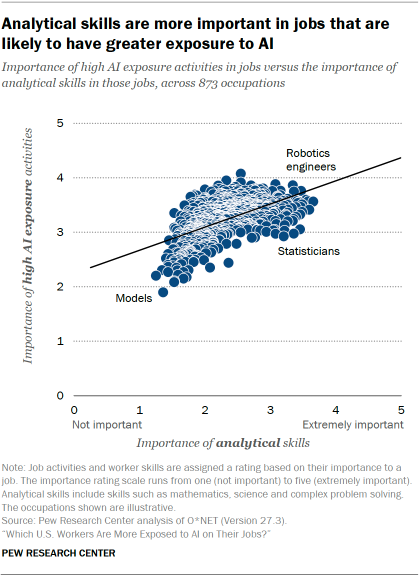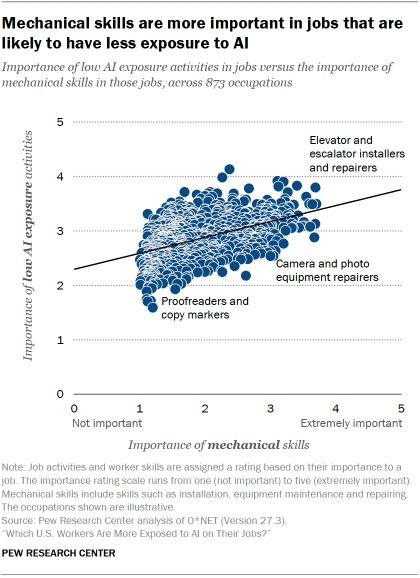In addition to the work activities they must perform, workers can also be classified by the skills they are required to have in order to perform their jobs. The O*NET database lists a total of 35 key skills, such as critical thinking, writing, science, negotiation, time management and repairing. In this analysis, we grouped these skills into five major skill families: social, fundamental, analytical, managerial and mechanical (refer to the text box for definitions of different skill groups). Then we looked at how these different job skills map with our assessment of how exposed different jobs are to artificial intelligence.
Social skills – instructing, service orientation, monitoring, social perceptiveness, coordination, negotiation, persuasion
Fundamental skills – critical thinking, writing, speaking, reading comprehension, active listening, active learning, learning strategies, judgment and decision-making
Analytical skills – science, mathematics, programming, complex problem-solving, systems analysis, systems evaluation, operations analysis, technology design
Managerial skills – management of personnel resources, management of financial resources, management of material resources, time management
Mechanical skills – troubleshooting, equipment selection, equipment maintenance, repairing, installation, operation monitoring, quality control analysis, operation and control
Our analysis shows that analytical skills, such as science, mathematics and programming, are more important in jobs that have high exposure to AI. In contrast, mechanical skills are more important to jobs with lower exposure to AI. The nature of these relationships is apparent from the charts that plot the importance of these skills and work activities across the 873 occupations we studied: The need for one rises with the need for the other.

Looking at the relationship between the importance of high AI exposure activities and analytical skills, jobs such as robotics engineers appear at the top right of the plot. For these engineers, analytical skills have an importance rating of 3.47 and high AI exposure activities have an importance rating of 3.76, both falling between “important” and “very important” in O*NET terminology.
Jobs in which analytical skills are not important and AI exposure is limited appear on the bottom left. For example, consider models, including fashion models or those who pose for artists or photographers. For them, analytical skills have an importance rating of 1.36 and high AI exposure activities have an importance rating of 1.90, both lying between “not important” and “somewhat important.”

On the other hand, mechanical skills, such as repairing and installation, are more important in jobs in which low AI exposure skills are more important. For elevator and escalator installers and repairers, who appear at the top right, mechanical skills have an importance rating of 3.69 and low AI exposure activities have an importance rating of 3.80, both between “important” and “very important.”
For proofreaders and copy markers, mechanical skills have an importance rating of 1.17 and low AI exposure activities have an importance rating of 1.72, between “not important” and “somewhat important.”
Relatedly, among the workers employed in jobs most exposed to AI, about six-in-ten (59%) have jobs in which fundamental skills like critical thinking are most important. Nearly half (48%) work in jobs in which analytical skills are most important. Smaller shares have jobs in which managerial (34%) or social (26%) skills are more important, and very few (2%) are employed in jobs in which mechanical skills are most important.




